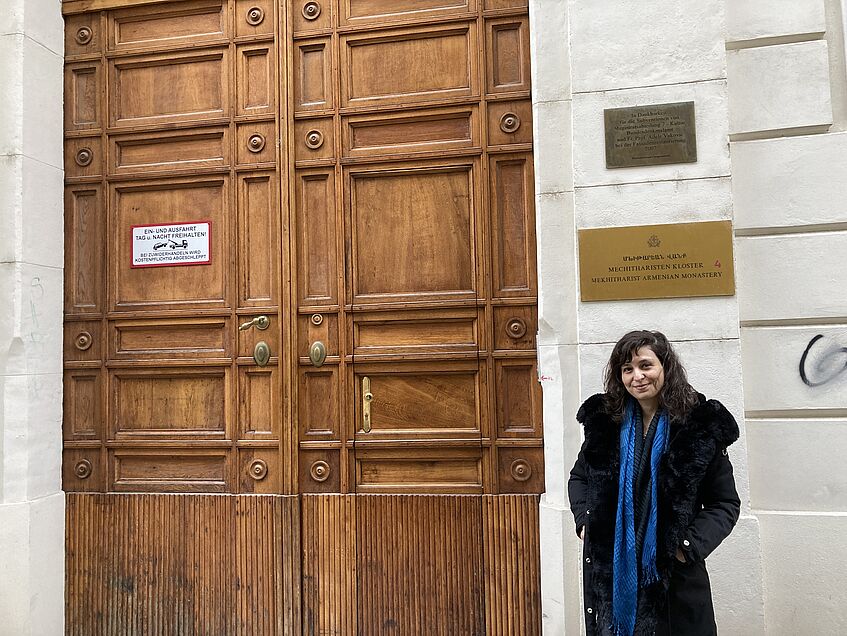Interview with Pınar Karakılçık (MA) (Andreas Tietze Fellow 2021)

Interview with Pınar Karakılçık (MA) (Andreas Tietze Fellow 2021)
Would you briefly introduce yourself?
I am a PhD candidate in Language Sciences at Institut National des Langues et Civilisations Orientales (INALCO) in Paris. Between 2013 and 2021, I was a research assistant in the Linguistics Department of Istanbul University.
What are you currently working on?
For my PhD project and beyond, I am working on the Armeno-Turkish literature as a source for the documentation of Turkish and the analysis of linguistic contact with a sociolinguistic approach. The sources in Armeno-Turkish emerge, in my linguistic research, as multilingual and trans-scriptal unrecognized corpora in the history of two languages in contact and a doorway to the deconstruction of the history of the Turkish language. The language contact existing in this corpus is, therefore, mainly Armenian-Turkish language contact which is considered generally as a disorder in this literature, as similar examples in several other languages of the world in contact, especially for a literary language standardization within the framework of republication of these œuvres.
Can you tell us a bit about your research stay in Vienna?
The Mekhitarist Monastery Library in Vienna, along with the library of San Lazzaro degli Armeni in Venice, is a unique library and manuscript repository for the researchers of Armeno-Turkish literature heritage. Thanks to the Andreas Tietze Memorial Fellowship and Hayr Simon, I had the chance to revisit the library of the Mekhitarist Monastery in Vienna after five years for the writing of my current papers and my research questions for post-doctoral project.
My first post-doc project will focus on the unreleased plays of Armeno-Turkish theater, which not only brings together my research questions in Armeno-Turkish socio-linguistics but also the fact that they are in great demand in Ottoman-Turkish studies research circles since their first examples were published in 2013 in Istanbul. Since these trans-scriptal pieces have a high level of plurilingual language practices, I, therefore, propose a method for corpus-driven computational sociolinguistics to explore and decipher these pieces of plurilingual theater in multiple ways which would make then the way to continue the socio-linguistic analysis of the general corpora in Armeno-Turkish. I hope my research will shed light on this literary, linguistic, and artistic heritage, and contribute to the growing field of Digital Ottoman Studies.
I should also add that by all means, I had the chance to get to know the team of the Ottoman and Turkish Studies in Vienna.
Do you want to publish your research or present it to the academic community? How will it go further?
I plan to come to Vienna next year again and present my ongoing research at the Workshop “The Ottoman-Armenian Soundscape: Music and Literature Entangled” that is organized by the Ottoman and Turkish Studies in Vienna in cooperation with the Mekhitarist Congregation in Vienna.
Do you have anything else to add?
Please allow me to reiterate what I wrote in my application letter for this fellowship:
I’m sure that the very honorable Andreas Tietze Memorial Fellowship for young researchers in Ottoman-Turkish Studies will open new doors for all of us. In addition to its great prestige, this Memorial Fellowship will bring me another glory too.
When I was a Master’s student at the University of Marmara and I asked myself the first question about Armeno-Turkish, there was only one book, which is from Tietze, for which I was lucky to meet from a friend’s library. This is the famous critical edition of the first Turkish modern novel written in Armeno-Turkish, “Akabi Hikyayesi”, who answered me. I went to the faculty with Tietze’s book to show my colleagues the door he opened to us and to justify the importance of these language resources. Following that door, I continue my research in Armeno-Turkish linguistics.
and
Thank you for welcoming me warmly to the heart of my favorite places of research in these difficult times to breathe amid a pandemic!
